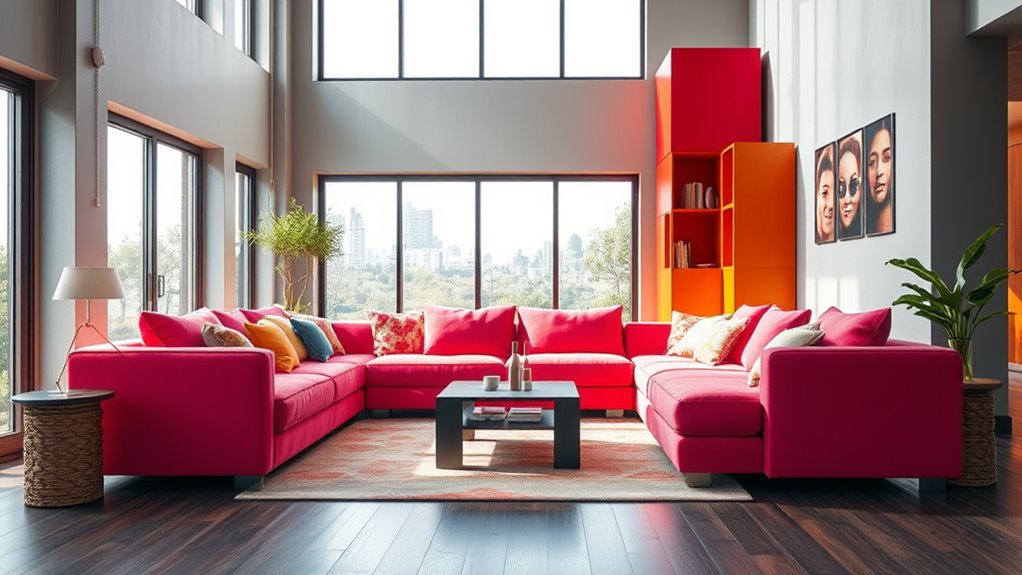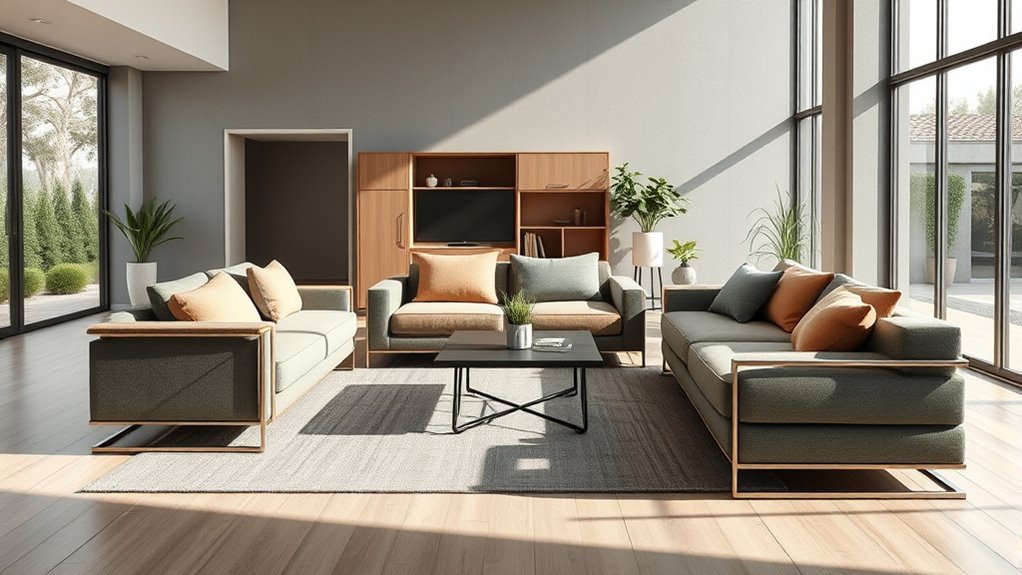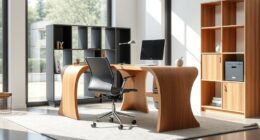Modular furniture designs give you the flexibility to customize and reconfigure pieces to fit changing needs and spaces. You can easily upgrade, replace, or rearrange components to create new layouts without buying new furniture. These designs also promote sustainability by reducing waste and supporting eco-friendly materials. With versatile options that maximize space and durability, modular furniture helps you create adaptable, eco-conscious environments. Keep exploring to discover more about how these innovative solutions can transform your space.
Key Takeaways
- Modular furniture’s customizable units allow for flexible configurations to suit changing space needs and personal styles.
- Reconfigurable modules enable quick adaptation, supporting dynamic environments like offices and evolving homes.
- Designed for sustainability, they facilitate recycling, reduce waste, and enable part replacements instead of entire pieces.
- Space-saving features and multi-purpose modules maximize utility in small or urban living environments.
- Made from durable, eco-friendly materials, modular furniture promotes environmentally responsible practices and longer product lifespan.

Have you ever contemplated how modular furniture can transform your space? This innovative approach to furnishing is all about individual units or components designed to fit together seamlessly. Instead of static pieces, you get modules that can be combined and rearranged in countless configurations, giving you the power to customize your environment easily. Designed for quick assembly and disassembly, modular furniture adapts to your changing needs without the hassle of buying new pieces.
Each module usually serves a specific function, like seating, storage, or surfaces, but remains compatible with others, allowing for flexible setups. Whether you’re decorating a home, outfitting an office, or designing a public venue, modular furniture offers versatile solutions that grow with you. The use of eco-friendly materials in manufacturing further enhances its appeal to environmentally conscious consumers.
Modules serve specific functions—seating, storage, surfaces—and remain compatible for flexible, adaptable setups.
The true strength of modular furniture lies in its flexibility and customization options. You’re not limited to a single design; instead, you can explore unlimited variations tailored to your space and personal style. Want a cozy corner for reading? Reconfigure your modules into a compact sofa. Need a larger workspace? Expand your desk setup with additional units. This adaptability makes it perfect for dynamic environments, such as offices that frequently change layouts or homes that evolve over time.
You can upgrade or replace individual parts instead of discarding entire furniture pieces, which saves you money and reduces waste. Plus, many modules serve multiple functions—like a sofa that converts into a bed or a table that doubles as a workspace—adding even more value and versatility. Additionally, the modular approach supports sustainable practices by allowing for easier recycling and repurposing of components, further reducing environmental impact.
Modular furniture is especially suited for small spaces and urban living, where every square foot counts. Its multi-purpose nature maximizes utility within limited areas, making it easier to create open, uncluttered interiors. For example, modular tables and seating can be expanded or collapsed depending on your needs, helping you save space when necessary. The ability to incorporate Suprem fabric into these units enhances comfort and durability, aligning with sustainability goals.
This aligns with minimalist design principles, fostering a clean, efficient environment. Because these units fit into standardized layouts, they facilitate better space utilization across diverse settings. You get the benefit of furniture that’s not just functional but also adaptable to your lifestyle. Regularly updating and customizing modular furniture also supports the Etsy Shops trend of personalized and sustainable home solutions.
Sustainability is another key advantage of modular furniture. By allowing you to replace only worn or outdated components, it reduces waste compared to traditional furniture, which often gets discarded entirely. Standardized manufacturing ensures precise production, minimizing material waste and promoting eco-friendly practices. Furthermore, many companies use recycled goods and local materials, further enhancing its environmental benefits.
Its upgradeability supports a longer product lifespan, helping you invest in furniture that can evolve with your needs. Made from durable materials like plywood, steel, or modern surfaces such as Corian, modular pieces are built to last. This combination of innovation and sustainability makes modular furniture an environmentally responsible choice that aligns with modern architectural and interior design ideals.
Conclusion
By choosing modular furniture, you’re not just getting pieces—you’re opening a universe of endless possibilities that can transform your space instantly. Imagine a single sofa turning into a bed, a desk expanding to suit your needs, all while saving the planet like a true hero. It’s so flexible and sustainable, you’ll wonder how you ever lived without this game-changing innovation. Get ready to revolutionize your home—because modular furniture isn’t just a choice, it’s a lifestyle!









